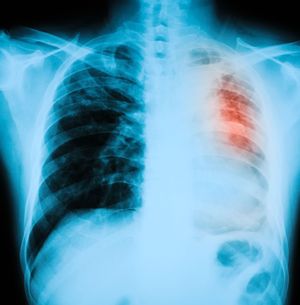Previous research has shown that erectile dysfunction is an early indicator for cardiovascular disease. Now a study published in the Annals of Family Medicine suggests that having erectile problems may also be a marker of undiagnosed diabetes.
The researchers looked at the association between erectile dysfunction and undiagnosed type 2 diabetes, hypertension and high cholesterol in more than 4,500 men aged 20 and older.
Among men with erectile problems 11.5 per cent had undiagnosed diabetes compared to 2.8 per cent among men without the disorder. In men aged 40 to 59, the rate of undiagnosed diabetes was 19 per cent in men with erectile dysfunction compared to 3.3 per cent in those without such problems.
Men with erectile dysfunction had more than double the risk of having undiagnosed diabetes. The probability of having undiagnosed diabetes increased from one in 50 in men without erectile dysfunction to one in 10 in men with erectile dysfunction.
No link was seen between erection problems and undiagnosed high blood pressure and high cholesterol.
"Men with erectile dysfunction should see their doctors to ensure they are properly screened for diabetes. Doing so may help prevent heart disease down the road. Conversely, doctors should ensure that they perform the proper screening for men with erectile dysfunction," the lead researcher advised.
Did You Know
Women who spend more than six hours of their leisure time sitting have a 10 per cent elevated risk of any caner; 65 per cent increased risk for multiple myeloma; 10 per cent increased risk for invasive breast cancer; and 43 per cent higher risk for ovarian cancer compared to women who sit for three hours or less.
Cancer Epidemiology, Biomarkers, and Prevention

Blues and birth defects
Taking certain antidepressants during pregnancy can increase the risk of birth defects.
The study, published in The BMJ, found associations between two antidepressants, fluoxetine and paroxetine, and certain birth defects when taken one month before conception through the third month of pregnancy.
The study included 17,952 mothers of infants with birth defects, and 9,857 mothers of infants without birth defects.
Fluoxetine and paroxetine were associated with a number of birth defects including heart wall defects, irregular skull shape (craniosynostosis), heart defects, intestines protruding outside the body and missing parts of the brain and skull.
The relative risk increased 2 to 3.5 times in infants whose mothers had taken fluoxetine and paroxetine.
The study, however, did not find any link with sertraline, the most commonly used antidepressant. About 40 per cent of women taking antidepressants were on sertraline.
No increased risk of birth defects was also seen with citalopram and escitalopram.
“The current analysis provides guidance to the safest treatment options during early pregnancy to minimise the risk of major birth defects, while providing adequate treatment of maternal depression,” the study concluded.

60 AT 30?
At your last high school reunion did you notice that some of your friends have aged much faster than you while others looked much younger?
A study of 38-year-olds from New Zealand, published in the journal Proceedings of the National Academy of Sciences, has found that their biological age can range from under 30 to nearly 60.
The researchers looked at key biological markers and assessed the health of 954 people to see how their bodies were actually ageing.
"What we found is a clear relationship between looking older on the outside and ageing faster on the inside. And also that it's possible to measure the kind of ageing process in young people that we usually only look for in old people," the study author said.
The participants have been part of an ongoing study since their birth in 1972-1973. At age 38, the participants' kidney, liver, lung, metabolic and immune functions were assessed along with cholesterol and blood pressure levels, dental status, eye structure, heart health and length of chromosomal caps known as telomeres. Telomeres are known to shorten with age.
Although they were free of age-related diseases, the 38-year-olds' biological age ranged from under 30 to nearly 60.
An analysis of data gathered six and 12 years earlier showed that some were ageing three biological years for every one chronological year while others gained zero biological years, thus staying younger than their age.
The fast-agers also fared worse on tests that measured balance and coordination, showed cognitive decline and brain ageing and had more trouble with tasks such as climbing stairs or carrying groceries.
Additionally, volunteers who looked at the participants' photos taken at age 38 rated those who were biologically older as looking older, too.
"This showed that already early in life we can see symptoms of advanced age in young people, symptoms that correspond to declining physical and cognitive function, long before age-related disease actually develops.”
Only about 20 per cent of ageing can be attributed to genes, the remaining 80 per cent are environmental and other factors.
“That gives us some hope that medicine might be able to slow ageing and give people more healthy active years.”
Limit intake
The US Food and Drug Administration is strengthening its warnings on commonly used nonsteroidal anti-inflammatory drugs (NSAIDs).
The FDA first warned in 2005 that taking NSAIDs may increase the risk of having a heart attack or stroke. But now it has further strengthened the warning following the recommendation of an expert panel that reviewed new information about NSAIDs and their risks. Although aspirin is also an NSAID, it is not included in the warning.
The risk of heart attack and stroke increases even with short-term use and may begin within the first weeks of use.
The risk increases with higher doses taken for longer periods of time. So patients should limit their intake to the lowest possible dose for the least amount of time.
The risk is greatest for people who already have cardiovascular disease, especially those who recently had a heart attack or cardiac bypass surgery. They may be at an increased risk of having another heart attack or dying of heart attack-related causes. People with heart disease or high blood pressure should talk to their doctor before taking NSAIDs.
Patients should be careful not to take multiple products containing NSAIDs at the same time. Some combination medicines like multi-symptom cold medicines may contain NSAIDs.
“There is no period of use shown to be without risk. Everyone may be at risk—even people without an underlying risk for cardiovascular disease,” said Dr Judy Racoosin, deputy director of FDA’s Division of Anesthesia, Analgesia, and Addiction Products.

Fat dad
Can fatherhood make you fat? A growing waistline is not just the problem of new moms. According to a US study published in the American Journal of Men's Health men do gain weight when they become fathers.
The study tracked 10,253 participants for over 20 years. They had their BMI measured at four different time points: early adolescence, later adolescence, mid-20s and early 30s.
About 3,425 men became fathers during the study period. Men who lived with their children saw a 2.6 per cent rise in BMI. Even new dads who did not live with their kids saw a 2.0 per cent increase in BMI.
In contrast, men who did not have kids actually lost weight during the study period.
While the weight gain may seem small, it might become significant if they continue to gain weight. Higher BMI can increase their risk of heart disease, diabetes and cancer.
"We know becoming a dad is a time when men's priorities and responsibilities change. It is changes in lifestyle that may be the cause. New eating habits, different foods and portions in the house, sleep changes, less time for exercise and activity perhaps may be part of the issue," commented the study author.

Antibiotics-arthritis link
Here's one more reason to avoid antibiotic overuse in kids. Children who take antibiotics have an increased risk of developing juvenile arthritis compared to children who do not receive antibiotics.
"This risk was greatest within a year of receiving antibiotics and increased with the number of antibiotic courses children were prescribed," noted the study author.
Children with newly diagnosed juvenile arthritis were compared with age- and gender-matched control subjects. Any antibiotic exposure in childhood doubled the risk of developing juvenile arthritis. The risk increased with added exposure. The risk was three times higher with five antibiotic courses.
Upper respiratory tract infections treated with antibiotics were more strongly associated with juvenile arthritis than untreated upper respiratory tract infections.
Use of antifungal and antiviral drugs was not associated with juvenile arthritis.
Antibiotics are often prescribed for many infections that would otherwise resolve on its own. The study author noted that patients with juvenile arthritis are also more vulnerable to serious infections because their immune system may not function properly.
The findings appear in the journal Pediatrics.
Did You Know
Women with mild cognitive impairment (mild thinking and memory problems) decline twice as fast as men with mild impairment: study presented at the Alzheimer’s Association International Conference in Washington

Predict risk of early death
According to a study published in the Annals of Internal Medicine, a simple heart scan can help doctors identify patients at risk of dying over the next 15 years.
Coronary artery calcification (CAC) scan uses a CT scan to look for calcium deposits in the walls of the coronary arteries. These specks of calcium are called calcifications and are an early sign of coronary artery disease.
For the study, 9,715 adults without any symptoms of coronary artery disease had CAC scans and provided information about their heart health; 936 patients died during the 15 years of follow-up. The risk of premature death increased steadily with increasing CAC scores.
People with the largest calcium deposits in their arteries had a six times greater risk of early death compared to those without calcium deposits. Even those with small levels of arterial calcium had a 68 per cent elevated risk of death.
"These findings give us a better understanding of the importance of coronary calcium scans to predict mortality. Patients with high calcium scores might be advised by their physicians to adopt healthier lifestyles, which could lead to better outcomes and potentially help lengthen their lives,” the study author noted.
Did You Know
Smokers are twice as likely to develop schizophrenia as non-smokers and at an earlier age.
Lancet Psychiatry

Wine makes you eat more
If you enjoy a glass of wine before dinner, you may want to pay more attention to what you eat after. Having a drink before dinner can actually make some people eat more.
For the study, published in the journal Obesity, researchers used fMRI scans to analyse the effect of alcohol on the brain in relation to food intake.
Researchers gave 35 healthy women an infusion of alcohol on one day and an infusion of plain saline on the second. On both days, MRI scans were used to record blood flow in the women's brains as they were exposed to food aromas and other odors after the infusion. Later the volunteers had lunch.
The hypothalamus showed more activity when exposed to food aromas than other types of odors after alcohol infusion. The hypothalamus regulates hormones that govern different body functions, including hunger.
Two-thirds of the participants also ate a bigger lunch after the alcohol infusion.
The findings explain the aperitif phenomenon and highlight the importance of avoiding absent-minded eating especially after enjoying a drink.
Strong case for statins
Guidelines issued in 2013 for prescribing cholesterol-lowering medications have been found to be accurate and effective, according to a Harvard study published in The Journal of the American Medical Association.
According to the guidelines, people aged 40 to 75 with at least a 7.5 per cent risk of having a heart attack or stroke over the next 10 years should receive statin drugs. Statins are also advised for people with cardiovascular disease, diabetes or high levels of bad cholesterol.
The current study sought to examine if the new guidelines are indeed effective.
The study focused on nearly 10 years of data on 2,435 people who did not have any heart disease and were not taking statins; 39 per cent of the participants would have been eligible for statin therapy under the new guidelines.
Three per cent of the participants suffered a cardiovascular event during the study period.
Further analysis showed that cardiovascular events had occurred significantly more often in patients who would have qualified for statin therapy under the new guidelines: 6.3 per cent of those who would have qualified for statin treatment suffered a heart attack or stroke compared to 1 per cent among those who would not have.
The findings illustrate that the new guidelines are more accurate and efficient in identifying people at a greater risk of cardiovascular disease who could benefit from statins. “There is no longer any question as to whether to offer treatment with statins for patients for primary prevention, and there should now be fewer questions about how to treat and in whom,” said an editorial that accompanied the article.
Revelatory test
Abnormal results on prenatal genetic tests that look for chromosomal abnormalities in foetuses may actually reveal cancer in the mother.
Noninvasive prenatal blood tests, which can be offered as early as the tenth week of pregnancy, are widely used around the world. The mother's blood, which contains fragments of both placental and maternal DNA, is analysed for possible chromosomal abnormalities. The sample may also contain cancer DNA if she has cancer.
The study published in The Journal of the American Medical Association reports on eight women who had abnormal prenatal test results. Further testing showed that their foetuses had normal chromosomes, but the women were subsequently diagnosed with cancer. The eight cases came from a larger database of 1,25,426 blood samples looking for foetal chromosomal abnormalities; 3,757 cases were positive for one or more abnormalities. Among the cases in which follow-up testing showed normal chromosomes, there were ten cases of cancer. Cancer was diagnosed during pregnancy or after delivery in eight of the women studied at an average of 16 weeks following the initial noninvasive testing. All the women had more than one chromosomal abnormality detected in their prenatal blood test. The study suggests there is a 20-44 per cent risk of maternal cancer if multiple chromosomal abnormalities are detected. “Noninvasive prenatal testing results may lead to findings of an underlying maternal condition, which, in these cases, was due to cancer. The take-home message is that women should be aware of this possibility when they seek testing,” the lead researcher suggested.
Did You Know
Older adults who follow simple lifestyle factors such as not smoking, walking briskly, engaging in moderate physical activity, drinking moderately, and maintaining a healthy weight can cut their risk of developing heart failure in half.
JACC: Heart Failure

Smart check
Your smartphone can tell with 87 per cent accuracy whether you suffer from depression, according to a study published in the Journal of Medical Internet Research.
For the study, researchers analysed data use and daily geographical locations of 20 women and eight men, average age of 29 years, over two weeks using an app.
The participants answered questions that measured depressive symptoms before the start of the study. At the end of two weeks, the researchers compared the test results with data use and geographical location.
While half of the participants did not have any signs of depression, half had symptoms ranging from mild to severe depression.
The more time someone spends on their phone, the more likely they are depressed. The average daily use for those who were depressed was 68 minutes compared to 17 minutes for those without depression.
Also, if GPS tracking showed someone as spending most of their time at home or in fewer locations, they were more likely to be depressed. Having a less regular day-to-day schedule and going to work at different times each day was also linked to depression.
Phone data was more reliable in detecting depression than daily questions participants answered about how sad they were feeling.
"The significance of this is that we can detect if a person has depressive symptoms and the severity of those symptoms without asking them any questions. Phones can provide data unobtrusively and with no effort on the part of the user," the lead researcher said.
The findings suggest that cellphones can be used to identify and monitor people at risk of depression and intervene early.
Clear the cloud with a cut
Treating cataracts with eye drops, rather than surgery, may soon be a reality.
Cataracts, which affect tens of millions of people, is also the leading cause of blindness. A cataract forms when proteins in the eye’s lens clump together, blurring vision. Right now, surgery is the only treatment for cataract.
A study in dogs and rabbits has successfully shown that a molecule called lanosterol that is naturally found in healthy eyes can break up the protein clumps that cloud the eyes' lens.
According to the study in the journal Nature, eye drops containing lanosterol completely cleared cataracts in three dogs after six weeks of treatment and partially cleared them in four other dogs.
Lanosterol eye drops could provide a cheaper and easier alternative for cataract treatment and can even be used to prevent cataracts in those at risk for developing them.
“The results we have point to a new nonsurgical treatment of cataracts that can be used for people who might have moderate cataracts or do not have access to surgery," the study author said.
The researchers hope to start human testing within two years.
Contributor: SHYLA JOVITHA ABRAHAM






